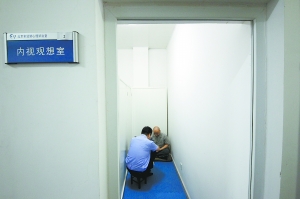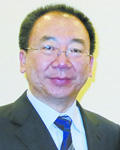|
 |
|
MEDITATION: A prisoner receives Naikan therapy in Beijing Municipal Prison (JIA YONGLI) |
What have I received from them? What have I given them? What troubles and difficulties have I caused them?
These are questions of self-reflection to be pondered by inmates of Beijing Municipal Prison, where convicts are undergoing Naikan therapy.
Developed in 1953 by Yoshimoto Ishin, a devout Japanese Buddhist of the Jodo Shinshu sect, Naikan is a form of therapy meaning "inside looking" or "introspection" featuring sensory deprivation.
Beijing hosts the first prison to introduce the therapy. Forty inmates have been treated since August 2012.
Prison guards with psychological backgrounds first guide prisoners to ponder the three introspective questions concerning the subject's relationship with his or her mother. Every hour, the guard prompts the inmate to articulate their discoveries, and expand the scope of questions to the prisoner's relationships with others.
Each session of voluntary treatment lasts seven days. Throughout the course, the prisoners are entirely isolated from external distractions except interaction with the guide. And instead of making authoritative orders, the guide will address the practitioner respectfully with nin, analogous to sir or ma'am.
Prisoner feedback
The treatment brought about positive effects among the prisoners. After the first session of the treatment, an inmate named Li regretted his refusal to admit guilt in his seven years behind bars. He realized that he had hurt his family and relatives and wanted to make up for his misdeeds.
"The past will never come back. I will lose no more opportunities and seriously reform myself. I want to turn my love back to my parents, wife and children," Li said.
Similarly, Liu is another prisoner treated by Naikan therapy. He subsequently realized his selfishness towards his father, with whom he refused to have contact during his two years in prison. When he was asked who he wanted to see if he died in ten minutes, he said it would be his father. The thought of imminent death made him realize the preciousness of life.
"I wanted to kneel down before my father and beg for his forgiveness," Liu said. "I stupidly thought money and power were the best things. But now I understand all my father wants me to do is to be a good man. I was too cruel to him. I want to see him immediately and let him know that I love him."
Views from experts
"Generally, it is psychological trauma that leads a person to crimes. He attacks others out of the hatred for other people and society," said Cao Guangjian, director of corrections at Beijing Municipal Prison.
Cao believes Naikan therapy could prevent hostilities between people by purifying attitudes. By reconsidering the relationship with one's parents, one would gradually learn to reassess his or her relationship with other people. In the end, subjects will realize his impulsiveness and misdeeds and start to change.
Japan has developed Naikan for six decades and Japanese law prescribes the introspective therapy for juvenile delinquents. It is even covered by medical insurance in some European countries, Cao noted.
|

|
|
Wei Shiwei, psychologist and director of Beijing Huaxia Psychological Education Center (JIA YONGLI) | According to Wei Shiwei, this method of self-reflection is applicable not only to prisoners but also to people of all walks of life. Wei is a psychologist as well as the director of Beijing Huaxia Psychological Education Center.
Wei said Naikan trains people to think for others and to find calm and happiness in life. In fact, Chinese traditional culture advocates living and understanding others, but the progress of the material world overshadows man's spirituality and makes people less happy.
He added that social problems such as lacking medical insurance and dysfunctions in the pension system add to people's insecurity, making them take compassion for granted in the reckless pursuit of wealth.
"If a person realizes that he has received much from others, yet has given little or even caused trouble for them, he will turn to be grateful and responsible," Wei said.
(Source: Beijing Evening News) | 